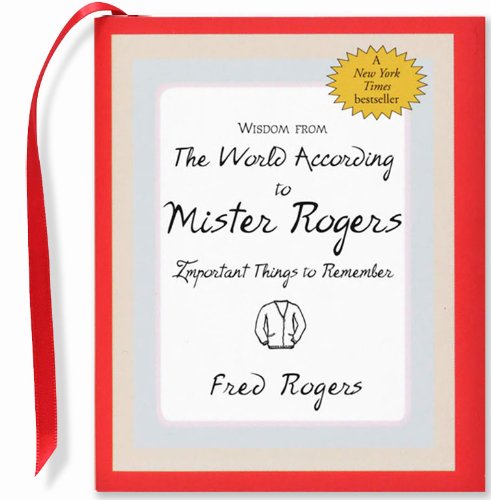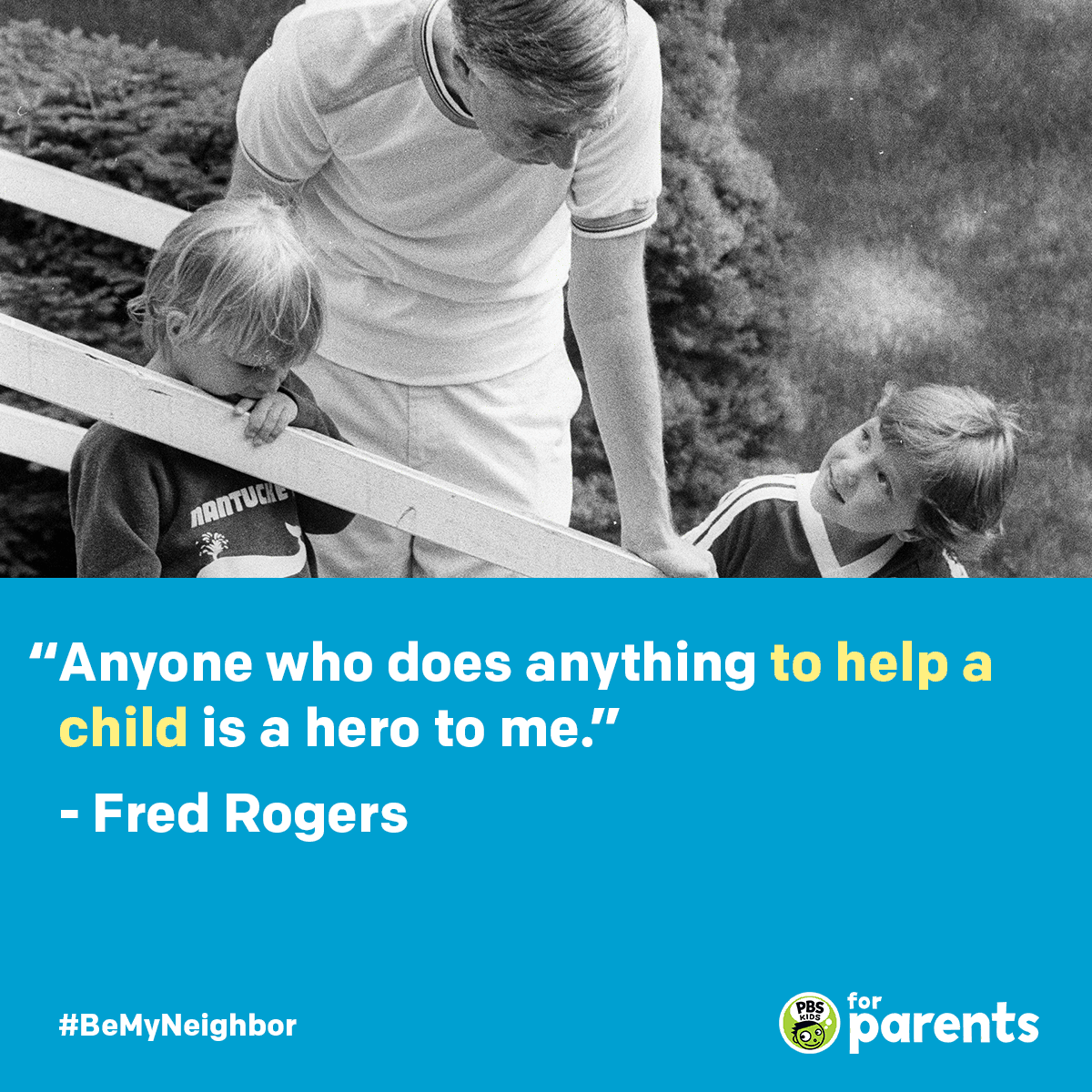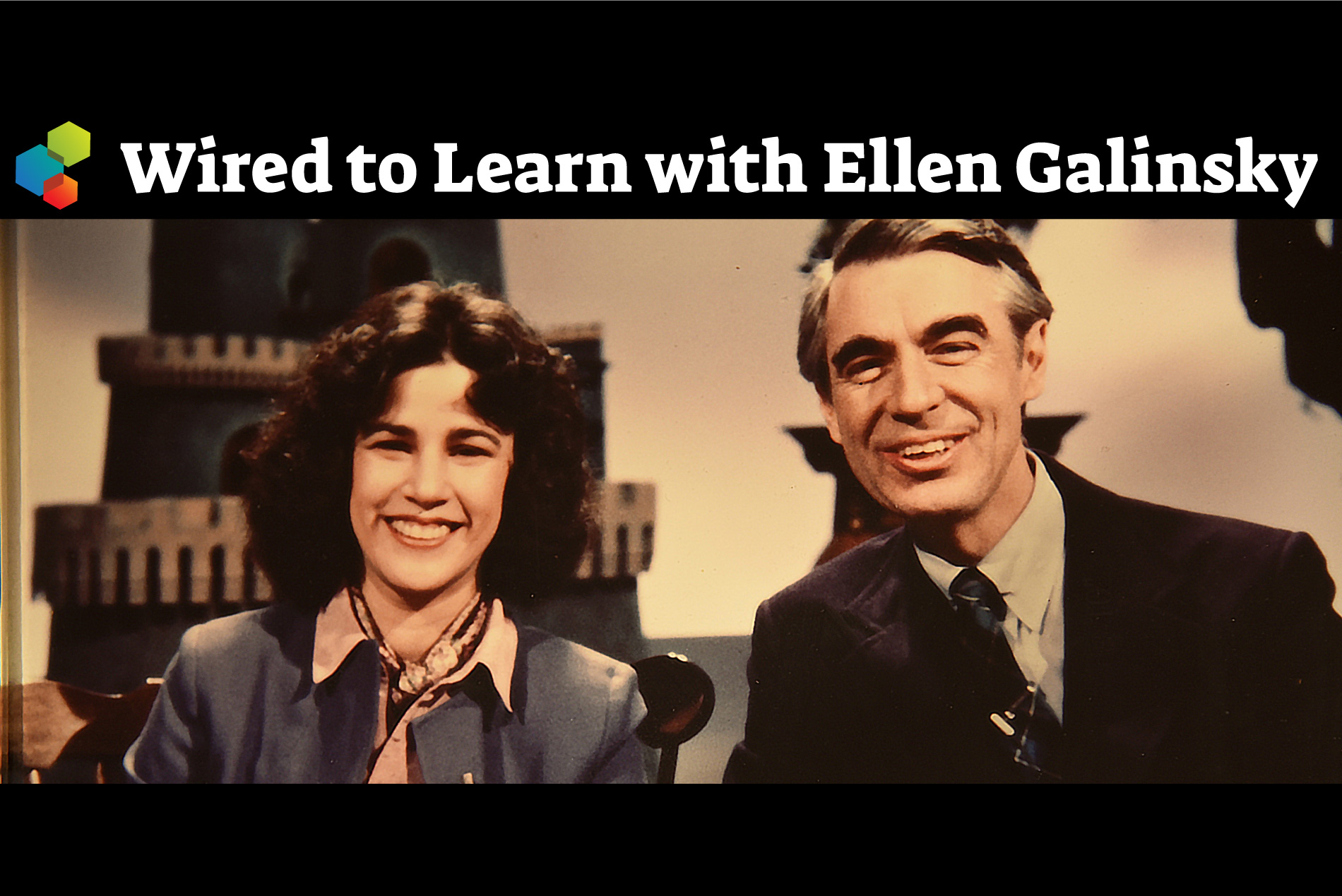In October 2003—a mere eight months after my friend and colleague Fred Rogers died—Hyperion published a beautiful book of his wisdom titled The World According to Mister Rogers: Important Things to Remember. Fred’s wife, Joanne gave me a copy a few months later.

I pulled out this well-worn, well-loved book as I prepared to write this remembrance of Fred. It’s been more than 16 years since he left us, but I haven’t wanted to write anything personal about him until now—now that someone else: Tom Hanks—will play Fred in a movie to be released this month. I already have a sense from the trailer that Tom Hanks will be incredible, but I want to try to capture Fred as Fred before I see the film.
Just looking at a title of the book, I am struck with an anomaly. “The World According to Mister Rogers” sounds as if Fred were pontificating. Yet, on every page, in every quote, there is a different story. Fred was a seeker of truth and it’s because of this impassioned seeking that we, or at least I, continue to turn to him. Like this quote: Discovering the truth about ourselves is a lifetime’s work, but it’s worth the effort.
Joanne called her life with Fred a journey. In the foreword to this book, she wrote: “The outside world may have thought that his qualities of wisdom and strength came naturally to him, but those close to him knew that he was constantly striving to be the best that he could be.”
Fred Rogers: A Seeker of Understanding
This certainly was my first impression of Fred. I met him when he came to Bank Street College. During his visit, he wanted to see The Family Center that I had helped to found; then he wanted to hear about its creation and to meet my baby Lara. He sat on the floor when I held her and he wanted to know everything—truly everything—about her.
And that was typical. Joanne says that when Fred was stopped by people in public, he ended up asking them more questions about themselves than he answered.
Margaret McFarland had become Fred’s most important child development teacher in his graduate studies at the University of Pittsburgh and their powerful relationship continued. She worked with him on the scripts for Mister Rogers Neighborhood as well as on his quest to understand himself, children and their development, and others.
I have never—and probably will never—have a call like the one I had with her. My memory is that it lasted three hours. My memory is that I was grilled—literally but kindly grilled—about every possible subject: my family growing up, my experiences with my own children, and my opinions about child development issues, from the typical to the most controversial subjects. There was no way anyone could have had prepared answers to her deeply insightful questions. She wanted to understand who I really was and how I responded under intense pressure. She, like Fred, was on a quest to understand.
Wonderfully for me, I was selected! I knew from the moment I got the call that this experience would change my life in wonderful ways.
It became a standing joke among Fred’s team on the first show—which included a live audience asking questions—that he would turn to me after a question and ask: “Ellen, what do you think?” I had to become quickly adept at turning back to him: “Fred, what do YOU think?
His answers reflected an uncanny and deep understanding of children and parents. I remember one mother saying that her child had become afraid of vacuum cleaners and Fred began to probe this child’s relationship with his father, which turned out to be a significant issue.
Fred wrote: “It came to me ever so slowly that the best way to know the truth was to begin trusting what my inner truth was…and trying to share it—not right away—only after I had worked hard at trying to understand it.”
Fred Rogers: A Seeker of Compassion
 Fred was always striving to understand feelings—he thought of himself as an emotional archeologist. He wrote: “Confronting our feelings and giving them appropriate expression always takes strength, not weakness.”
Fred was always striving to understand feelings—he thought of himself as an emotional archeologist. He wrote: “Confronting our feelings and giving them appropriate expression always takes strength, not weakness.”
He wrote of the strength it takes to acknowledge and curb anger, channeling it appropriately. He wrote of the strength it takes to face sadness and let it flow into tears. “It takes strength to talk about our feelings and to reach out for help and comfort when we need it.” He added, “There is no “should” or “should not” when it comes to having feelings…When we can believe that, we may find it easier to make constructive choices about what to do with those feelings.”
Fred wrote of growing up in an era when expressing emotion, especially for boys, was taboo—though it still remains somewhat taboo. He also wrote about seeing his father cry when his beloved grandfather died and how Fred cried when his own father died, suspecting that his father would approve.
He always strove for compassion in acknowledging emotions. When Joanne would become angry at someone, Fred would pause and remark, “I wonder what is going on in that person’s day.”
“Listening is where love begins.”
I sometimes would stop in Pittsburgh to see Fred and Bill Isler, the President of Family Communications, and others on my way back and forth to visit my mother in West Virginia. One conversation during a Pittsburgh stop is indelible. At the time, Saturday Night Live was making fun of Fred. He asked me to watch a clip with him and then turned to me, asking, “Why would they do this?” It was before the time when making fun of others was an unfortunate everyday all-the-time media occurrence. Fred was hurt, but he strove to understand what prompted others to be cruel so he could turn his feelings from pain to compassion. Subsequently, Fred and Eddie Murphy (who was playing Mister Robinson on Saturday Night Live) met at the NBC studios and Fred came to understand that these skits were meant to be funny, not mean.
When a child was freaking out in a public place, Fred always advised bystanders not to be bystanders—not to condemn the parent or to turn away, but to offer “one kind word.” What a different experience parenting would be if we all followed Fred’s example.
If you have ever watched his testimony to a hostile Congress, you’ll see that it was in his full access to the emotional lives of children that he found power. As Senator Pastore said at the end of this testimony, “looks like you just earned 20 million dollars [for public television].” This clip was played at his funeral.
Fred Rogers: A Seeker of Acceptance
Ultimately, what Fred strove for was to have everyone accepted for being themselves. “You Are Special” was the title of his book. Once I think of his song, “It’s You I Like,” I can’t stop singing it to myself.
Fred wrote: “If the day ever came when we were able to accept ourselves and our children exactly as we and they are, then, I believe, we would have come very close to an ultimate understanding of what ‘good’ parenting means.”
What profound words!! Fred also wrote: “Love isn’t a state of perfect caring. It is an active noun, like struggle. To love someone is to strive to accept that person exactly the way he or she is, right here and now.”
Written by Fred M. Rogers © 1971
It’s you I like,
It’s not the things you wear,
It’s not the way you do your hair
But it’s you I like
The way you are right now,
The way down deep inside you
Not the things that hide you,
Not your toys
They’re just beside you.
But it’s you I like
Every part of you.
Your skin, your eyes, your feelings
Whether old or new.
I hope that you’ll remember
Even when you’re feeling blue
That it’s you I like,
It’s you yourself
It’s you.
It’s you I like.
That doesn’t mean we shouldn’t work to become better and to do better. That was axiomatic to him. But he felt we would do so more effectively, if we feel loved and accepted. This is the essence of what I have come to call asset-informed.
I believe that it is BECAUSE Fred was such an impassioned seeker of truth that he made such an impression in his lifetime and beyond.
During the time of the Saturday Night Live spoofs, Fred came to see me in my office in New York. At the time, we had a group of teenagers interning with us. These young people had struggled with serious adversity in their lives and were interning as part of a path toward healing. I had no idea how they would react to Fred since they knew more from the jokes about him on TV than from knowing him on his TV show for children. In fact, I worried. But was I wrong. When he walked in, you would have thought that the most popular rock star of the moment had entered our office. This group of seemingly tough young people flocked to him. They were awe-struck and opened up to him. He did not disappoint, then or now.
New generations continue to be raised with Fred Rogers, thanks to Daniel Tiger’s Neighborhood. My grandson would sing, “What do you do with the mad that you feel,” when he got upset as a two-year-old. The documentary about him won multiple awards, and I suspect the new film will be a big hit. We all want his type of kindness in our lives.
As for me, I knew the day I got the phone call to appear in his show that my life would change in many wonderful ways and it has. He and his team became dear friends. After his retirement, I was honored to have been asked to work with him to help plan his legacy at the Fred Rogers Center at Saint Vincent College. And I was asked to give a speech for him when he was diagnosed with stomach cancer—in case he hadn’t recovered enough to make it. Tragically, he didn’t make it and I had to give that speech. But traveling back from the speech with his team—all of us grief stricken and telling stories about the laughs we had shared with Fred, I was struck with how few leaders are loved that much from close-up, as well as from afar.
Fred Rogers has enriched our lives—those knew him in person and those who know him through his words, his songs, and his shows.
In seeking, Fred continued to find his truth. Through his seeking, generations-to-come will find Fred Rogers.
MORE:
Film Trailer: “A Beautiful Day in the Neighborhood”
Video: “It’s You I Like,” PBS
Website: Fred Rogers Center at Saint Vincent College
Website: Fred Rogers Productions
PHOTO CREDIT, FEATURED IMAGE: Ellen Galinsky and Fred Rogers circa 1980. Photo by Fred Rogers Productions

Ellen Galinsky
Ellen Galinsky is the chief science officer at the Bezos Family Foundation where she also serves as executive director of Mind in the Making. In addition, she is a senior research advisor for the Society for Human Resource Management (SHRM). She also remains president of Families and Work Institute. Her life’s work revolves identifying important societal questions as they emerge, conducting research to seek answers, and turning the findings into action. She strives to be ahead of the curve, to address compelling issues, and to provide rigorous data that can affect our lives.



